Enterprise businesses need platforms that can handle complex operations, scale seamlessly, and support diverse business models. Choosing the right enterprise ecommerce platform is one of the most critical decisions for modern brands trying to streamline processes, create market visibility, and drive growth.
Whether you’re building a B2B marketplace, scaling a D2C channel, or managing hybrid B2B2C and quick commerce operations, the platform you select determines how quickly you can adapt, scale, and personalise customer journeys.
While there are many ecommerce solutions that make it to the list of the best ecommerce platforms, choosing the ideal fit for your brand can be a challenging balancing act. From legacy open-source systems to modern SaaS and composable commerce solutions, each enterprise ecommerce platform comes with its own strengths, trade-offs, and costs.
In this blog, we compare the 10 best ecommerce platforms trusted by enterprises worldwide, highlighting their technology, business model support, integrations, and AI capabilities.
Table of Contents
- Top 10 Enterprise Ecommerce Platforms In 2026
- 1. StoreHippo - AI-Native, Composable, Plugin-Free
- 2. Shopify Plus – Fast Deployment but Plugin-Heavy
- 3. Magento (Adobe Commerce) – Customizable but Resource-Intensive
- 4. BigCommerce - Scalable SaaS with Native B2B
- 5. Salesforce Commerce Cloud- CRM-Powered Commerce
- 6. SAP Commerce Cloud - Robust but Complex
- 7. WooCommerce – Flexible but Scaling Limits
- 8. Oracle CX Commerce - Enterprise Ecommerce Solutions
- 9. Shift4Shop – Enterprise Ecommerce Solution With Native Features
- 10. Spryker Cloud Commerce OS – Composable Enterprise Solution
- Conclusion
- FAQs
Top 10 Enterprise Ecommerce Platforms In 2026
This detailed comparison is designed to help decision-makers cut through the noise and see how each enterprise ecommerce solutions stacks up against modern enterprise needs. From scalability to personalization and future-readiness, we spotlight what truly matters before making a long-term investment.
Here we go with the 10 strongest contenders for best ecommerce platform for enterprises:
1. StoreHippo - AI-Native, Composable, Plugin-Free
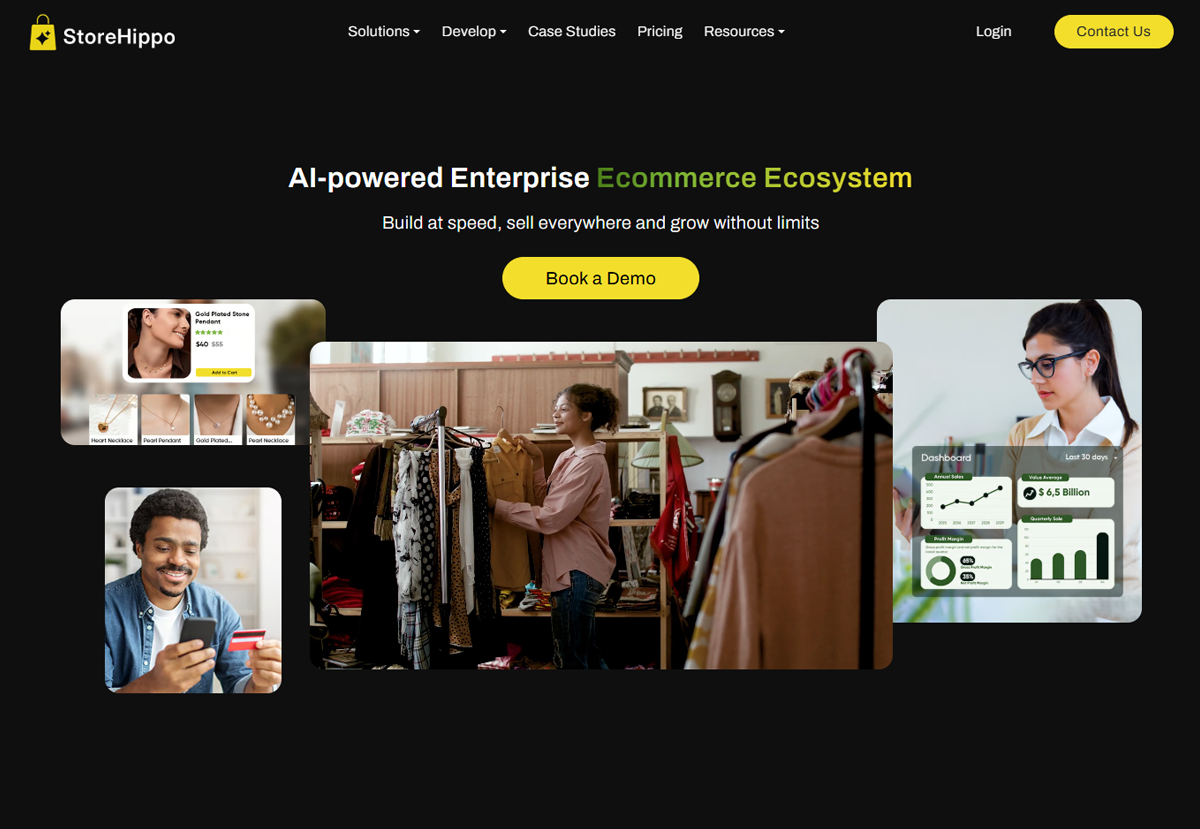
StoreHippo is one of the leading enterprise ecommerce platforms that combines MACH architecture, mobile-first design, and 300+ native features to offer end-to-end ecommerce solutions to businesses of every scale and size, across industries. The AI-powered platform is battle-tested for complex multi-location and cross-border rollouts. StoreHippo’s enterprise solutions offer everything needed to build a robust brand presence, delivering scalability, support for diverse business models, and AI-driven commerce without the clutter of plugins, across businesses of every size.
Technology:
Pure headless architecture, MACH, Mobile-first design
Ease of Customisation:
High flexibility with custom workflows, APIs, and customisable backend + frontend
Support of Business Models (Native vs Plugin):
Native support for enterprise ecommerce solutions for B2B, B2C, D2C, B2B2C, Quick Commerce, Hyperlocal Commerce, multi vendor marketplace, Multistore network, B2B2C - Native (dealer/retailer-powered marketplaces).
Mobile Apps And Omnichannel Support:
Built-in no-code mobile app builder (Android & iOS). PWA-ready, plus supports omnichannel touchpoints like AI shopping assistant, web store, WhatsApp Business, social commerce etc.
AI Readiness:
Native AI tools - semantic search, personalised product recommendations, AI-powered cataloguing for smarter conversions, AI image enhancer, support for building customised multilingual AI voice and text shopping assistant
Ease of Integration:
Open APIs and pre-built connectors for ERP, CRM, DMS, accounting, and marketing tools
Payment Solutions and Charges:
Pre-integrated with 60+ Indian and global payment gateways, supports UPI, wallets, and COD
Logistics Support:
Pre-integrated with 30+ logistics providers - domestic, international, and hyperlocal. WhatsApp-based simplified fulfilment management and delivery updates.
Pros:
- All-in-one enterprise ecommerce platform, built to support any industry or business model
- 300+ native features with no plugin dependency or hidden costs
- Flexible enough to pivot quickly into new, hybrid, or combination business models
Cons:
- For teams used to plugin-based platforms, StoreHippo’s all-in-one approach can feel underwhelming initially till they experience the powerful features and ease of use
- Brand awareness outside India is still growing, though the feature set already matches or exceeds established names
Pricing:
- Multiple plans starting $449/month
- Custom enterprise pricing based on scale and business model
- No hidden costs or platform surcharges
- Payment gateway charges apply as per provider
Best Suited For:
StoreHippo enterprise solutions give B2B, B2C, D2C, and B2B2C enterprises that want a single ecommerce platform to handle marketplaces, quick commerce, omnichannel, and AI-driven growth without plugin overhead.
2. Shopify Plus – Fast Deployment but Plugin-Heavy
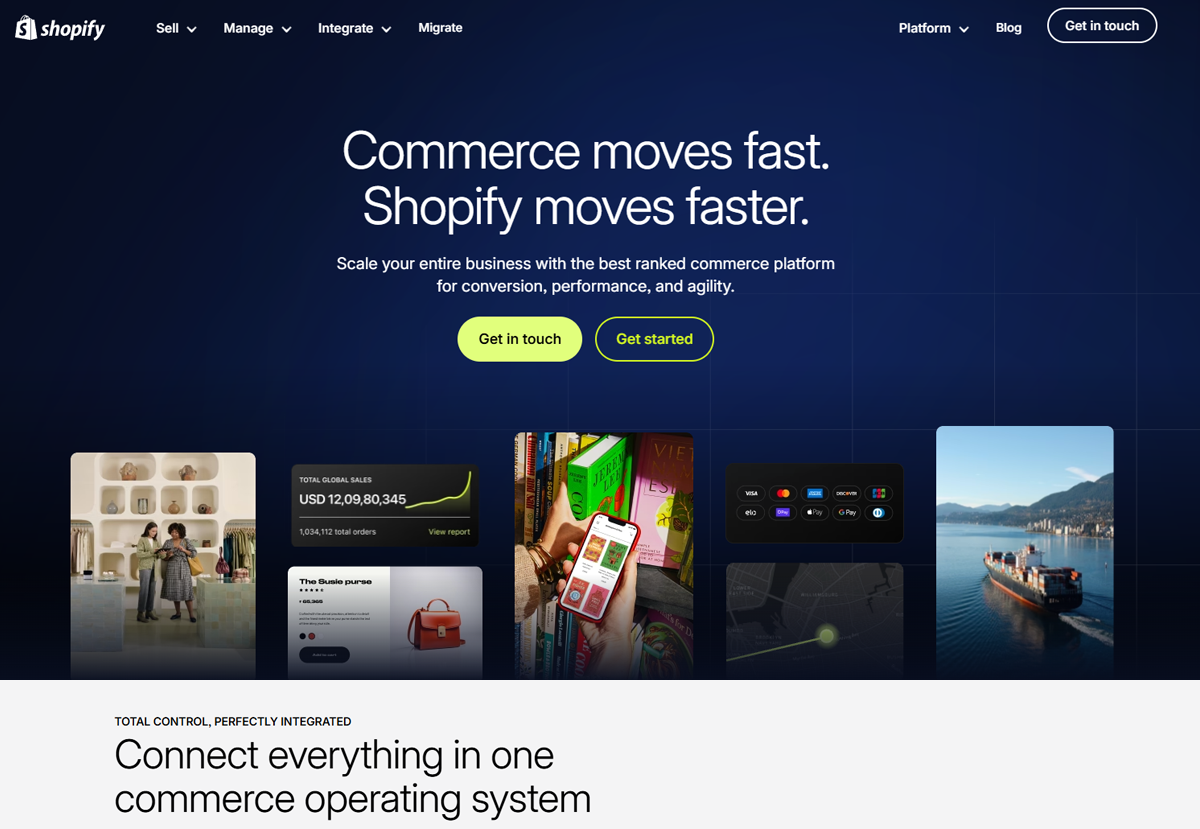
Shopify Plus is one of the well known ecommerce platforms for enterprises that have a B2C set up and want a quick rollout. It’s widely used enterprise ecommerce solution for D2C and B2C brands for its ease of setup, however, advanced enterprise needs often require heavy reliance on third-party apps.
Technology:
Ruby on Rails, MySQL, Redis, and JavaScript on the backend, with a custom templating language Liquid for the frontend
Ease of Customisation:
Easy for front-end; backend customisation often requires apps or developers.
Support of Business Models (Native vs Plugin):
Native support for B2C and D2C, but advanced functionalities and business models like B2B
Marketplace, Quick Commerce are heavily plugin/app dependent.
Mobile Apps & Omnichannel Support:
Mobile-friendly themes, mobile apps and omnichannel via third-party solutions.
AI Readiness:
Basic AI tools via apps; no native AI stack
Ease of Integration:
Strong app ecosystem, but high plugin reliance.
Payment Solutions & Charges:
Shopify Payments + third-party gateways; additional transaction fees if not using Shopify Payments.
Logistics Support:
Available in select geographies; requires external apps for full functionality.
Pros:
- Quick setup, user-friendly
- Large app ecosystem and partner network
Cons:
- Heavy plugin dependency raises costs and complexity
- Limited native B2B, hybrid models, multi store and marketplace features
Pricing:
Starts at ~$2,000/month + App and transaction costs.
Best Suited For:
D2C and B2C brands looking for enterprise ecommerce solutions with simple setups.
3. Magento (Adobe Commerce) – Customizable but Resource-Intensive
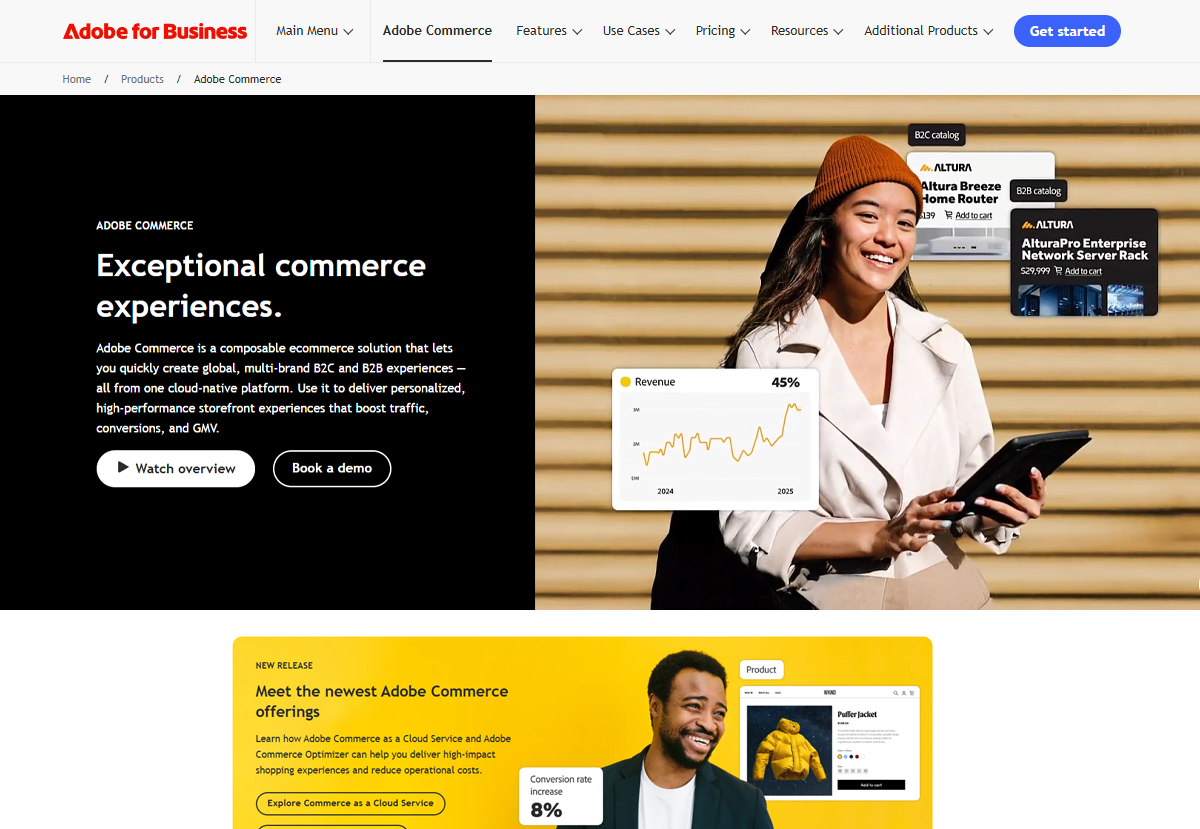
Magento is a popular open source enterprise ecommerce platform with a cloud option (Adobe Commerce) for brands that want flexibility and control. Magento, now Adobe Commerce, is often used by brands with complex catalogues that need deep customisation. However, its heavy resource requirements and high ownership costs make it challenging for businesses seeking agility.
Technology:
PHP, MySQL along with Apache or Nginx, Varnish, Redis, and Elasticsearch.
Ease of Customisation:
Very high; requires skilled developers and IT resources.
Support of Business Models (Native vs Plugin):
Native B2C, B2B available via Adobe modules, plugin or custom builds for marketplace, Quick Commerce, Hyperlocal.
Mobile Apps And Omnichannel Support:
Enterprise ecommerce solutions include responsive storefronts. Mobile apps and omnichannel need extensions or custom development.
AI Readiness:
Adobe Sensei AI for personalisation (premium).
Ease of Integration:
Integrates well with the Adobe ecosystem; external integrations often need development.
Payment Solutions & Charges:
Supports global gateways; payment integrations typically via extensions.
Logistics Support:
Basic tools available; advanced logistics via third-party modules.
Pros:
- Extremely flexible and customisable
- Strong community and Adobe ecosystem
Cons:
- High development and maintenance costs and bug-prone due to open source
- Longer time-to-market than SaaS competitors like StoreHippo enterprise solutions
- Needs periodic platform upgrades
Pricing:
Enterprise pricing starts around $40,000/year, scaling with complexity.
Best Suited For:
Large enterprises with complex catalogues and strong in-house IT teams.
4. BigCommerce - Scalable SaaS with Native B2B
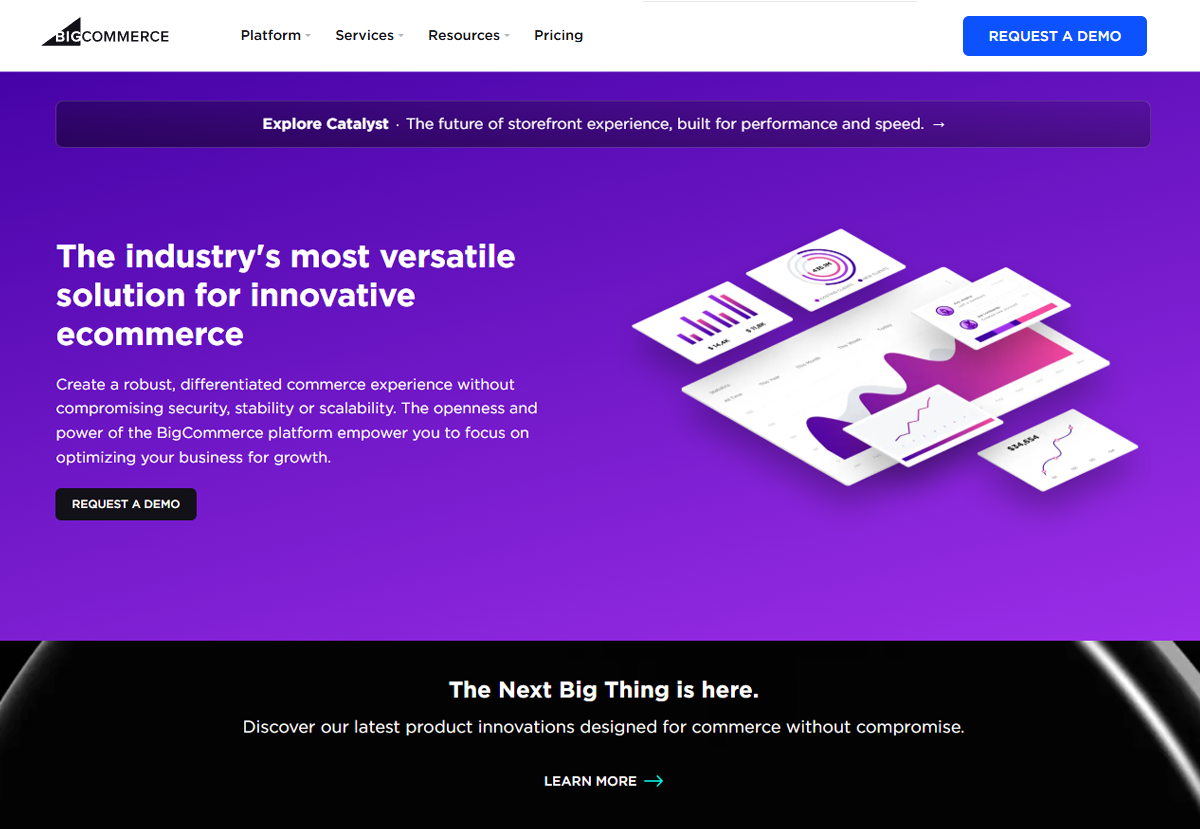
BigCommerce is a SaaS-based enterprise ecommerce platform for mid-market and enterprise brands. It offers native B2B features through its higher plans. However, advanced customisation and marketplace-style models often require external apps or development.
Technology:
SaaS-based, API-first, supports headless commerce. PHP on the backend and JavaScript, HTML, and Handlebars.js for its "Stencil" storefront framework.
Ease of Customisation:
Moderate; APIs available, but less flexible than open-source and other competitors like Shopify and StoreHippo enterprise solutions.
Support of Business Models (Native vs Plugin):
Native B2C, D2C, B2B (quotes, custom pricing); marketplace, quick commerce via plugins.
Mobile Apps and Omnichannel Support:
Mobile-ready themes; integrations with Amazon, eBay, and social channels.
AI Readiness:
No native AI stack; partner apps provide AI tools.
Ease of Integration:
Strong ERP/CRM integrations, open APIs.
Payment Solutions and Charges:
Supports 65+ gateways; no platform transaction fees.
Logistics Support:
Shipping and fulfilment via apps; global providers supported.
Pros:
- SaaS convenience with built-in B2B features
- No additional transaction fees
Cons:
- Limited flexibility compared to open-source platforms
- Advanced features often need third-party apps
Pricing:
Enterprise plans are custom, additional cost for plugins
Best Suited For:
Mid-to-large brands that need enterprise ecommerce platforms for scaling B2B and B2C operations.
5. Salesforce Commerce Cloud- CRM-Powered Commerce
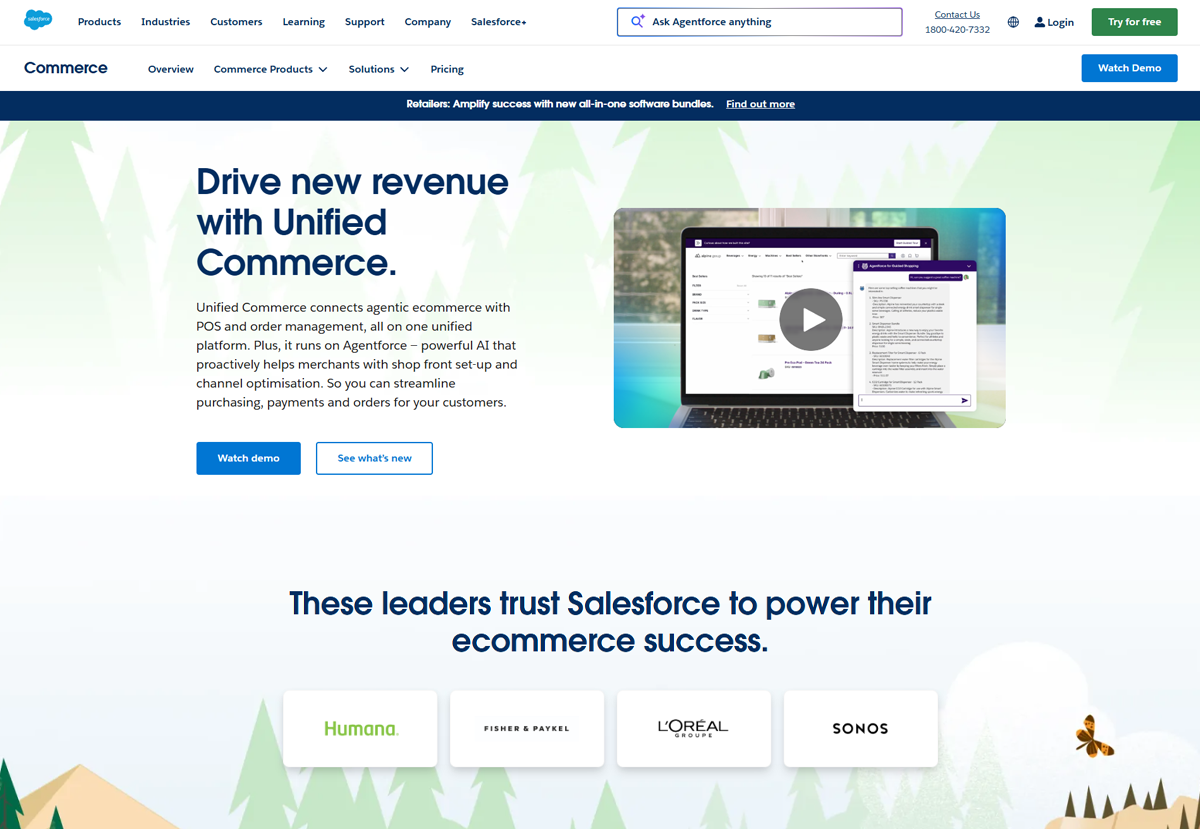
Salesforce Commerce Cloud is an enterprise ecommerce platform designed for B2C and D2C brands that prioritise customer engagement. It combines ecommerce with Salesforce’s CRM ecosystem for creating personalised experiences. However, high licensing costs and reliance on the Salesforce stack can limit flexibility for some enterprises.
Technology:
SaaS-based, part of the Salesforce ecosystem. Complex proprietary blend using Java-like Apex for backend logic, and Lightning Web Components (LWC) using JavaScript, HTML, and CSS, with a custom, multi-tenant relational database powered by Oracle.
Ease of Customisation:
Good within Salesforce; limited outside ecosystem.
Support of Business Models (Native vs Plugin):
Native B2C, D2C, B2B however enterprise ecommerce solutions for marketplace models require extensions or integrations.
Mobile Apps and Omnichannel Support:
Omnichannel features integrated with Salesforce CRM, mobile-ready storefronts.
AI Readiness:
Einstein AI for personalisation and recommendations.
Ease of Integration:
Seamless with Salesforce tools; external systems need connectors.
Payment Solutions and Charges:
Supports global gateways; charges depend on the provider.
Logistics Support:
Basic shipping tools; advanced logistics via Salesforce AppExchange partners.
Pros:
- Deep CRM integration for customer insights
- Strong personalisation with Einstein AI
Cons:
- High licensing and implementation costs
- Heavy reliance on the Salesforce ecosystem
Pricing:
Enterprise licensing, typically starts around $4,000/month.
Best Suited For:
B2C brands focused on CRM-driven personalisation and omnichannel engagement.
6. SAP Commerce Cloud - Robust but Complex
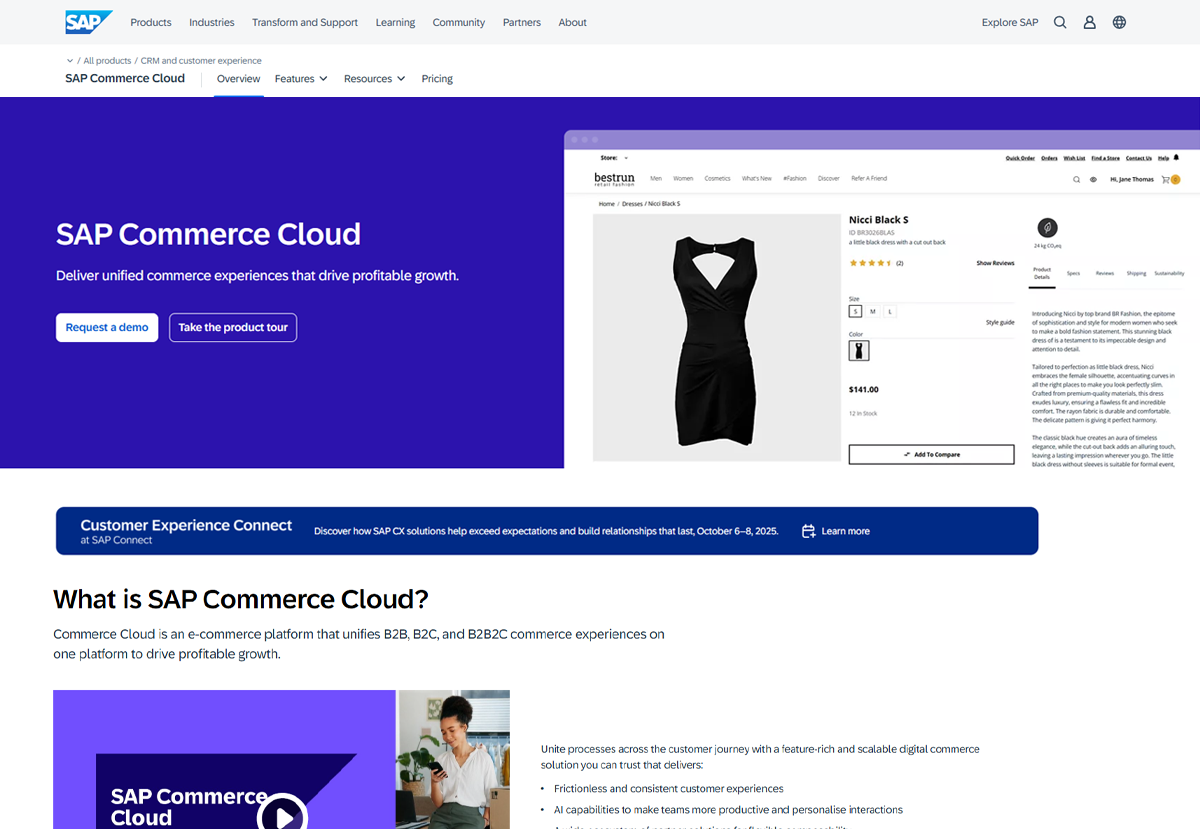
SAP Commerce Cloud, formerly Hybris, is an enterprise ecommerce platform known for handling large catalogues, complex workflows, and global pricing. Its key strength lies in supporting advanced B2B operations and multi-site commerce. However, long implementation cycles and high costs make it less agile compared to newer SaaS competitors like StoreHippo enterprise solutions and viable only for very big enterprises that can have large inhouse teams.
Technology:
Java-based, part of SAP CX suite, cloud-hosted.
Ease of Customisation:
High, but requires experienced SAP developers.
Support of Business Models (Native vs Plugin):
Native B2B, B2C, D2C. Marketplace, hyperlocal, and quick commerce need extensions.
Mobile Apps and Omnichannel Support:
Omnichannel support available; mobile apps often need third party partners for development.
AI Readiness:
AI and ML tools are available through SAP CX add-ons.
Ease of Integration:
Seamless with SAP ERP; third-party systems need connectors.
Payment Solutions and Charges:
Supports global gateways; implementation via integrations.
Logistics Support:
Strong supply chain links with SAP ERP; advanced logistics via partners.
Pros:
- Handles complex enterprise workflows and global operations
- Strong ERP and supply chain integration
Cons:
- Expensive to implement and maintain
- Long deployment timelines limit agility
Pricing:
Custom enterprise pricing, often in six figures annually.
Best Suited For:
Large enterprises with SAP ERP investments and complex B2B operations.
7. WooCommerce – Flexible but Scaling Limits
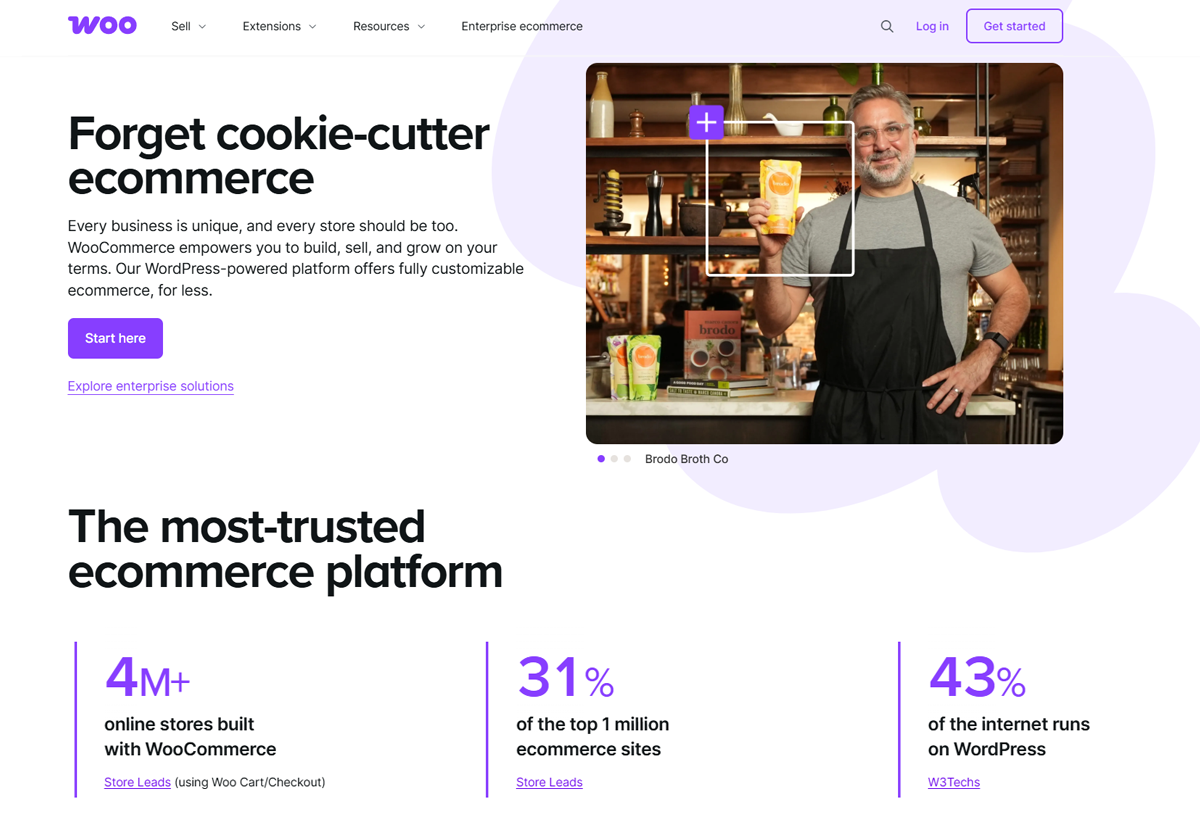
WooCommerce is a WordPress plugin that turns content sites into online stores. It’s one of the best ecommerce platforms for SMEs and content-driven brands because of its flexibility and low entry cost. However, as businesses grow and reach operations requiring enterprise ecommerce solutions, heavy reliance on plugins and performance issues become major challenges.
Technology:
Open-source plugin for WordPress, PHP/MySQL based.
Ease of Customisation:
High with developers; backend requires coding expertise.
Support of Business Models (Native vs Plugin):
Native B2C but B2B, marketplace, quick commerce, hyperlocal, all plugin-based.
Mobile Apps and Omnichannel Support:
Responsive themes, however, mobile apps, and omnichannel require third-party solutions.
AI Readiness:
Available only through external plugins.
Ease of Integration:
Strong with the WordPress ecosystem but external integrations done via plugins.
Payment Solutions and Charges:
Supports global gateways but are mostly plugin-dependent.
Logistics Support:
Basic shipping tools only; advanced features via plugins.
Pros:
- Low cost to start
- Highly flexible and developer-friendly
Cons:
- Plugin overload affects performance
- Scaling for enterprise is resource-heavy
Pricing:
Core plugin free; hosting + plugins can range $500–$5,000/year+.
Best Suited For:
SMEs or content-first brands already on WordPress, not ideal for big enterprises looking for best ecommerce platforms.
8. Oracle CX Commerce - Enterprise Ecommerce Solutions
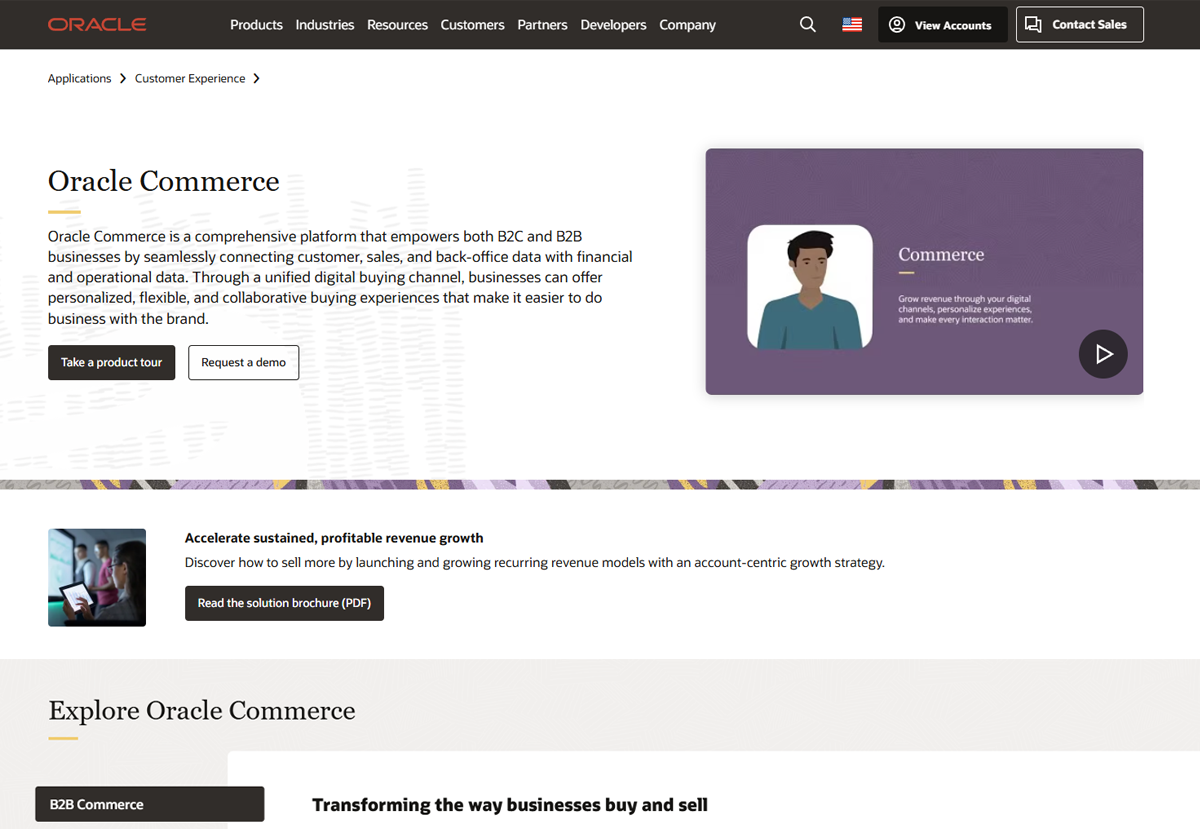
Oracle CX Commerce is an enterprise ecommerce platform built for brands already invested in the Oracle ecosystem. It has robust multi-site management and personalisation, but requires significant resources and is less agile compared to newer SaaS players like StoreHippo enterprise ecommerce solutions.
Technology:
Cloud-based, part of the Oracle CX suite.
Ease of Customisation:
Good with Oracle tools but external customisation often complex.
Support of Business Models (Native vs Plugin):
Native B2C, D2C. B2B and marketplace models usually require extensions or custom builds.
Mobile Apps and Omnichannel Support:
Responsive storefronts but omnichannel features available through Oracle integrations.
AI Readiness:
Oracle AI tools are available but not deeply embedded.
Ease of Integration:
Strong within Oracle suite but external systems need connectors.
Payment Solutions and Charges:
Supports major global gateways, often partner-dependent.
Logistics Support:
Basic tools built-in the neterprice ecommerce solution suite, advanced logistics require integrations.
Pros:
- Deep integration with Oracle enterprise software
- Strong multi-site management and scalability
Cons:
- Expensive and complex to implement
- Less flexible compared to lighter SaaS platforms like StoreHippo enterprise solutions
Pricing:
Custom enterprise pricing; typically six-figure implementations.
Best Suited For:
Large enterprises already running on Oracle stack seeking CX + commerce integration.
9. Shift4Shop – Enterprise Ecommerce Solution With Native Features
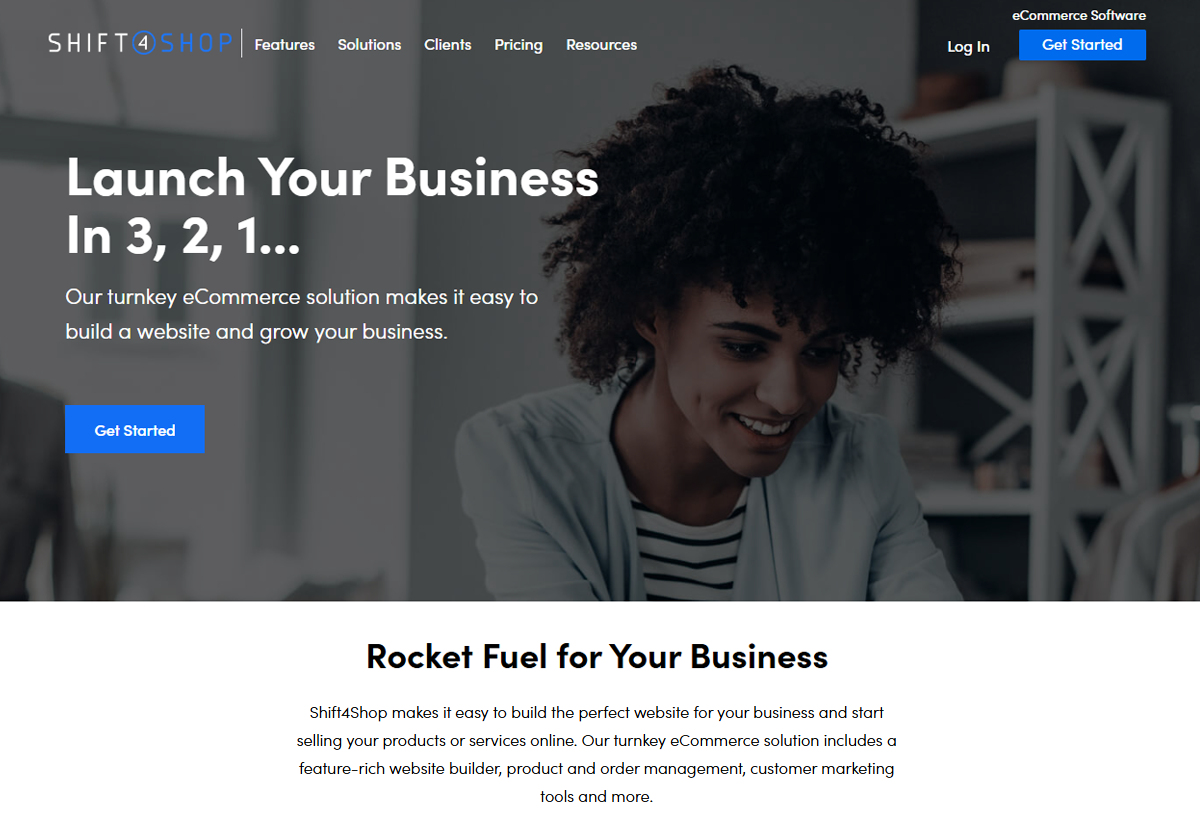
Shift4Shop is a hosted SaaS enterprise ecommerce platform aimed at high-volume stores. It offers many built-in tools and features to reduce dependency on add-ons, but may require trade-offs on modern architecture (e.g. headless/composable flexibility) for some enterprise use cases.
Technology:
Cloud/SaaS based, PCI-certified, Microsoft Azure infrastructure, automatic updates.
Ease of Customisation:
Good visual/theme customisation; advanced changes require developer effort and API usage.
Support of Business Models (Native vs Plugin):
Native: B2C, D2C, wholesale/bulk, subscription models. Plugin or partner-based for more niche models (hyperlocal, complex marketplaces) depending on integrations.
Mobile Apps and Omnichannel Support:
Responsive design built in; but no built-in store-management mobile app or mobile app builder. Third party services needed to build mobile apps.
AI Readiness:
Not prominently AI-first, more reliant on partner/integrated services or plugins for advanced personalisation or intelligent search.
Ease of Integration:
Strong REST APIs; many native integrations with ERP/payment/shipping tools to build enterprise ecommerce solutions fro brands; good connector ecosystem.
Payment Solutions and Charges:
Supports 160+ payment providers; Shift4 Payments built-in; no transaction fees on many plans.
Logistics Support:
Real-time shipping rates, inventory and order management; built-in tools for shipping/carrier integrations; multi-region hosting for performance.
Pros:
- Extensive built-in features, reducing need for third-party apps.
- Transparent enterprise pricing tiers; good cost predictability.
- Strong hosting, uptime, and security commitments (PCI compliance, uptime SLAs).
Cons:
- Less flexible enterprise ecommerce platform if you need fully headless/composable setup.
- Deep customisation might require more development / vendor support.
- Support feedback in some regions is mixed (response time, documentation).
Pricing:
Tiered enterprise plans: e.g. ~$499/month for lower volumes, scaling up to higher monthly fees + custom plans for large enterprise; setup fees apply.
Best Suited For:
Businesses needing a feature-rich platform with many enterprise capabilities out of the box, but not the best ecommerce platform for those who require extreme customisation or headless/composable architectures from day one.
10. Spryker Cloud Commerce OS – Composable Enterprise Solution
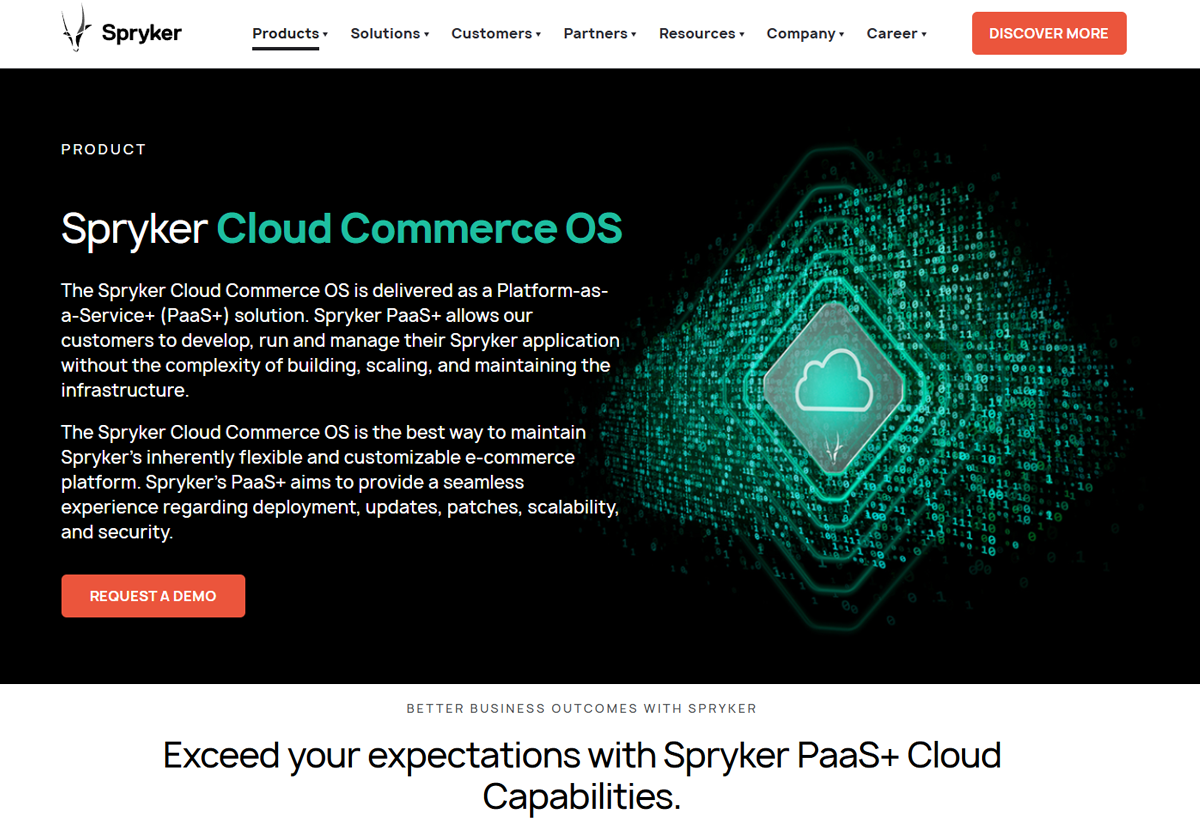
Spryker Cloud Commerce OS is a composable enterprise ecommerce platform built for enterprises needing modularity and flexibility. It supports complex, multi-model commerce setups and is strong in B2B and marketplace use cases. However, it demands significant developer expertise and can be cost-heavy for enterprises seeking faster rollouts.
Technology:
Cloud-native, API-first, headless and composable architecture.
Ease of Customisation:
Very high; modular design requires developer teams.
Support of Business Models (Native vs Plugin):
Native B2B, marketplace, D2C. Quick commerce and hyperlocal supported with customisation.
Mobile Apps and Omnichannel Support:
Headless approach supports mobile, IoT, and omnichannel integrations.
AI Readiness:
AI features via partner integrations; no deep native AI stack.
Ease of Integration:
APIs and ecosystem partners for ERP, CRM, and third-party tools.
Payment Solutions and Charges:
Supports major global gateways, integration are usually partner-led.
Logistics Support:
Basic integrations are available but advanced logistics require custom setup.
Pros:
- Flexible and modular enterprise ecommerce platform for complex needs
- Strong in B2B and marketplace scenarios
Cons:
- Developer-intensive and resource-heavy
- Higher cost of ownership for enterprises without in-house tech teams
Pricing:
Custom enterprise pricing, typically premium for modular setups.
Best Suited For:
Large enterprises with complex B2B, marketplace, or composable commerce requirements.
Conclusion
All ten platforms listed above qualify as the best ecommerce platforms for enterprises, each offering its own mix of strengths and limitations. However, the right choice depends on your business model, scale, and the level of flexibility and agility your brand requires. While our detailed comparison and reviews give a clear understanding of the existing enterprise ecommerce solutions, nothing replaces a first-hand experience of how a platform works for your unique needs.
That’s why we recommend exploring each option directly, starting with the first on our list. If you’re evaluating modern, AI-native enterprise ecommerce solutions, begin with StoreHippo. See how StoreHippo can streamline your operations, unify multiple business models, and accelerate enterprise growth, book a demo right away.
FAQs
1. What are the non-negotiable features an enterprise should look for in an enterprise ecommerce platform?
Enterprises should prioritise agility, flexibility, and the ability to adapt to evolving market needs. Features like scalability, multi-model support, native integrations, and AI-driven personalisation are essential. StoreHippo enterprise solutions, with its built-in features, MACH architecture, headless and composable design, delivers all of these natively, reducing complexity and future-proofing enterprise growth.
2. Does customisation cost extra on the best ecommerce platforms?
On plugin-based platforms, heavy customisation usually means extra costs for developers or apps. However, some modern platforms like StoreHippo enterprise ecommerce solutions offer most features built in, which minimises the need for third-party add-ons. With its headless, composable setup, StoreHippo enables enterprises to customise workflows, storefronts, and integrations without hidden costs or ongoing plugin dependency.
3. Which is better for fast-growing brands: a large plugin-based enterprise ecommerce platform or one with native features?
Plugin based enterprise ecommerce solutions offer variety but often lead to performance issues, higher costs, and integration delays. Native features, like those in StoreHippo enterprise solutions, give enterprises stability, faster rollouts, and lower total cost of ownership which are critical as the business grows.
4. What hidden costs should decision-makers watch out for in enterprise ecommerce platforms?
When evaluating the best ecommerce platforms, brands should look beyond license fees. Many platforms add costs for plugins, transaction fees, and integrations. StoreHippo enterprise solutions avoids this by offering 300+ native features and keeping pricing transparent right from the start.
5. Can one enterprise ecommerce platform handle both global expansion and localised experiences?
Yes, but not all do it efficiently. StoreHippo offers multilingual stores, multi-currency support, and region-based pricing helping enterprises scale globally while serving local buyers effectively through built in hyperlocal and quick commerce support.

